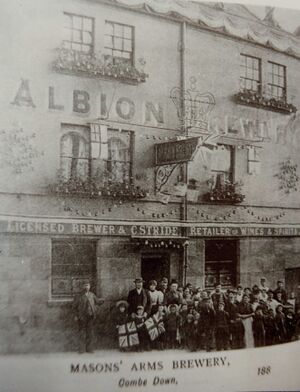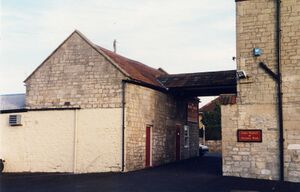Thomas Stride
Thomas Stride, Albion Brewery, Bird in Hand, 8 Corn Street, Bath, Somerset.
The Stride family operated breweries and pubs in Bath from the 1870s until 1888. The plant at the Bird in Hand was offered for auction July 18th 1913.
Also brewed at the Burnt House Inn Brewery, Odd Down, until the brewhouse was converted into a skittle-alley.
Also at the Red Lion, Odd Down and the Three Cups, Walcot Street.
Also at the Oxford Brewery, Southgate Street, until 1913. Ewart R Reynolds recorded here between 1921 and 1924.
The Strides of Odd Down, Bath Three generations of Brewer Publicans by Michael Jones
A turnpike ran from Radstock to Bath and at Odd Down, on the outskirts of Bath, there was a toll house. Local tradition has it that in the latter part of the 19th Century, when turnpikes were becoming increasingly freed of toll, some Gypsies refused to pay the toll and returned in the night to burn it down. This happened when Thomas Stride was building his brewery on the opposite side of the road; not unnaturally he decided to call it the Burnt House Brewery.
Thomas Stride was born in 1852 of farming stock. He went into general dealing and by the 1870's had built up sufficient capital to build his first brewery and public house. He married one of the daughters of the Russell family (another local family who owned pubs and breweries).
A Licence to Brew dated October 1904 shows he also brewed at the Albion Public House, Corn Street, Bath - but it is uncertain when he first started to do so at that site. He also ran the Oxford Stores in Bath. Thomas's brother, Charles, ran the Red Lion Inn, Odd Down and The Tree Cups, Walcott Street, Bath.
At Odd Down, Thomas had built both a brewery and a pub. The pub, called the Burnt House Inn, was a large one and was further extended by an additional bay in 1901. It had a lounge, public bar, darts room and jug and bottle. Attached to the brewery was a 9 pin skittle alley and a rifle range. There was a full range of pub games including cards, darts, dominoes and shove ha'penny.
When Thomas died in May 1927, he had amassed a considerable fortune. He left œ24,000 in cash together with many properties including the brewery and public house, Tunnel Farm of 92 acres, 1 - 9 Burnt House Cottages, Stanley House in Camden Road and a house in Pulteney Gardens.
He left the pub and brewery to his younger son, William Russell Stride. The rest of the property was split between the elder son, Charles, and 4 daughters.
William had 4 sons and 2 daughters. Money was left in Thomas's will for the two elder sons to be educated at Lewisham College, Weston Super Mare. These were Reginald William Francis, born 25 December, 1918, and Robert John Thomas, born on 18 July, 1920.
It is these two gentleman who provided the information for this article. Reg became a fireman on the Somerset and Dorset Railway whilst Bob became a self employed electrician.
The brewery was separated from the public house. It had a coal fired boiler and the two boys were often persuaded to be stokers. The mash tun was by the copper, the underback on a separate floor and the final boil was done in the same copper. The cooler was a long water cooled trough. Water was obtained from the brewery's own well. Coal was brought from the Tunley Pit, the malt from Bairds at Broad Quay and the hops were from California. The brewing reference book was the The Brewer's Pocket Companion published in 1901.
The average brew length was 180 gallons and brewing took place every 3 weeks or so. The spent grains were sold to Mr Davey, a local farmer. Most of the beer was sold on draft or delivered by horse and cart within a 5 or 6 mile radius to local farmers, wholesalers and off licences.
The beer itself was a light bitter beer (sold as XX) and this was occasionally darkened using caramel and make slightly stronger for the winter months (sold as XXXX).
A small percentage was bottled by hand - the Home Brewed Beer labels were stuck on with the waste yeast barm. The pub also sold Oakhill Brewery Co. Ltd's Invalid Stout and bought in bottled Bass and Guinness.
William was a leading light in the Bath Cycling Club - being a life member. He took several first places in the Bath - London cycling trials.
Brewing ceased in 1946. Beer had become in plentiful supply and the copper needed replacing. In addition, the use of lead piping was falling into disfavour.
The Burnt House Inn however continued as a free house with beers supplied from a variety of brewers including Usher's Wiltshire Brewery Ltd, Bristol Brewery Georges & Co. Ltd, Lamb Brewery Ltd and Eldridge, Pope & Co. Ltd
William died on 20 December 1961 aged 74 years. All the property was sold and the proceeds shared between his children. Reg bought one of the houses on a mortgage and ran it as a guest house (he has since won several prizes for his window box displays). Courage bought the old brewery building and public house and Bob became the tenant of the pub. The old brewing equipment was removed and the room converted into a new skittle alley. BFI1 TLittle else changed in the Burnt House Inn and Bob and his wife ran the pub until they retired on 3 May 1988. The month prior to their retirement was a continuous retirement party. Deliveries were made twice a week and during that month, the pub was Courage's largest account in Bath.
Thus ended, on a high note indeed, the association of the Strides with the brewery and Public House at Odd Down.
As a postscript, the pub was then closed for 6 months for refurbishment and then reopened as The Lamplighter. In view of the name change, the Strides did not go to the opening. They did visit once however - and will not do so again because of all the changes. Externally however, little has changed and the brewery and pub still stand as a a testimony to the Strides of Odd Down.

